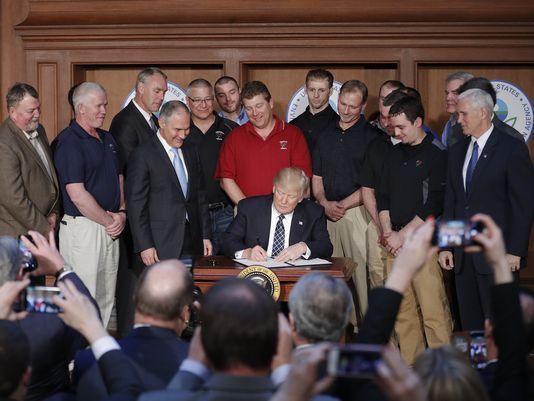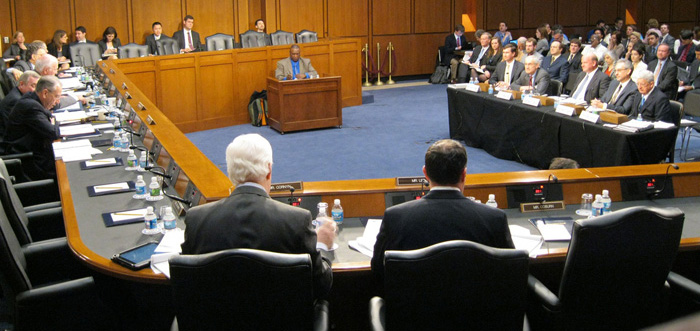
President Trump signs Executive Order promoting affordable energy
Today President Trump signed an executive order supporting affordable energy by undoing previous executive orders that increased the cost of producing electricity. This is a step towards preserving affordable energy for all Americans including family businesses.
During his speech announcing the Executive Order, President Trump said:
“With today’s executive action, I am taking historic steps to lift the restrictions on American energy, to reverse government intrusion, and to cancel job-killing regulations. And, by the way, regulations not only in this industry, but in every industry. We’re doing them by the thousands, every industry. And we’re going to have safety, we’re going to have clean water, we’re going to have clear air.”
Here is Majority Leader Kevin McCarthy’s statement on the Executive Order:
“President Trump is taking action to keep the lights on in our homes, our factories, and throughout our economy’s supply chain. America will have a stronger future by developing, not neglecting, the abundant energy resources our land offers. The rationale behind this action is what Republicans have been arguing for years: environmental protections and economic growth are not mutually exclusive. Innovation and technological changes have proven our ability to advance energy development in a cleaner and safer way. We are a resilient people who power a resilient economy. Unleashing our energy potential will strongly support jobs and healthier lives for everyone.”
The Executive Order can be found here: https://www.whitehouse.gov/the-press-office/2017/03/28/presidential-executive-order-promoting-energy-independence-and-economi-1

Tax credit has helped create a robust industry in New Mexico, report says
By Christopher Ortiz
New Mexico has benefited from its renewable energy production tax credit, which has supported more than 11,000 jobs and represents $1.6 billion in economic activity, according to a new report.
The report, released by Family Businesses for Affordable Energy this week, says the state has established has “a robust renewable energy generation sector with enormous potential for growth” and clean power is a wise investment for New Mexico. The credits are set to expire next year.
Over 13 years, $120 million in renewable energy production tax credits have been claimed. New Mexico has seen 13 commercial wind facilities with a capacity of 1.1 gigawatts and 46 solar photovoltaic facilities with a capacity of 452 megawatts come online. According to the report, power producers that have taken advantage of the renewable energy production tax credits have spent $1 billion in the state constructing, equipping, operating and maintaining 31 generation facilities. For every $1 in state tax expenditure, these projects generated $5 in labor income, the report claims. The report points out that the tax credits are not the only factor considered in where and when renewable energy facilities are built.
According to the Santa Fe New Mexican, proposed legislation would extend the renewable energy tax credits through 2023. The legislation would also raise existing caps on the amount of renewable energy production eligible for the credits.
O’Donnell Economics and Strategy prepared the report for Family Businesses for Affordable Energy, which says it supports policies that lower energy prices for small businesses. Data for the report came from the New Mexico Energy, Minerals and Natural Resources Department. A 2015 report from the same department found that for every 14 cents in tax expenditure, renewable energy production tax credit projects generated $1 in labor income.
http://www.bizjournals.com/albuquerque/news/2017/03/08/tax-credit-helped-renewables-nm-report-says.html

New Mexico’s Wind/Solar Tax Credit Works New Study Finds 11,700 New Jobs, $1.6 Billion Created
Family Businesses for Affordable Energy (FBAE) today announced a new economic impact study, finding that New Mexico’s solar/wind tax credits have created more than 11,700 jobs, $1.6 billion in economic activity and more than $600 million in new labor income.
The FBAE analysis estimated the economic impact of New Mexico’s Renewable Energy Production Tax Credit (REPTC) and now represents the most current research on the subject. The REPTC, originally implemented in 2003, is a credit against New Mexico personal or corporate income tax that is available to companies that produce electricity from renewable resources for commercial sale.
“These tax credits are a phenomenal success for New Mexico,” said Palmer Schoening of the FBAE. “Taxpayers are getting a huge return on their investments in clean energy – new jobs, new investments, new economic activity –while reaping the additional environmental benefits that come from clean energy. This is a win-win-win situation for taxpayers, consumers, and businesses throughout New Mexico.”
Findings of the study include:
- A total of $120 million in Renewable Energy Production Tax Credits have been claimed over the past 13 years. During that time, New Mexico has made significant progress in developing its wind and solar power capacity, gaining 13 commercial wind facilities with nameplate capacity of 1.1 gigawatts and 46 solar photovoltaic (PV) facilities with nameplate capacity of 452 megawatts.
- During that time, REPTC-certified power producers have spent over $1 billion in New Mexico to construct, equip, operate, and maintain 31 generation facilities. Expenditures by REPTC-certified power producers have supported 11,771 full and part time jobs, $611 million in employee compensation, and $1.6 billion in economic activity statewide.
- For every $1 in state tax expenditure, REPTC-certified projects generated over $5 in labor income.
- These economic impacts have generated state and local tax revenue totaling $74.6 million and averaging $6.8 million annually.
Palmer called for the extension of the REPTC, an extension that will lead to more new jobs and investments, while helping to lower the cost of energy for families and businesses. The REPTC is set to expire January 1, 2018. A bipartisan bill (HB440 and SB432) changes and temporarily extends the program. The goal: to support continued investments in New Mexico while also adjusting the tax credit itself to better reflect the decreased costs of building renewable energy facilities.
In addition, the bill provides a more appropriate end date for the program, phasing out the production tax credit by 2023—as opposed to ripping the rug out from under companies already invested as well as the ones on the waiting list.
“New Mexico has made great progress in renewable energy since implementation of these tax credits,” he said. “Our study proves beyond any doubt that for every dollar you invest, New Mexico gets $5 dollar back in labor income, thousands of new jobs and billions in new investment. Solar and wind done right reaps great benefits for New Mexico, and New Mexico has been doing it right.”
O’Donnell Economics and Strategy conducted the study. Kelly O’Donnell is an economist and research professor at the University of New Mexico Institute for Policy, Evaluation, and Applied Research. Her specialties include regional economic development, economic impact analysis, and state fiscal policy. Prior to academia, Dr. O’Donnell held a series of leadership roles in New Mexico state government including Director of State Tax Policy, Deputy Cabinet Secretary for Economic Development, and Superintendent of the New Mexico Regulation and Licensing Department. She holds a PhD in Economics from the University of New Mexico.
O’Donnell can be reached at 505-659-5702 or [email protected].
Schoening can be reached at 202-787-1399 or [email protected]

LI business owners’ wish list for Trump: Repeal regulations
By Aisha Al-Muslim and Daysi Calavia-Robertson
Many small business owners on Long Island say they are overtaxed and overregulated, and are hopeful President Donald Trump will deliver on his plans to cut taxes and reduce federal regulations, which they cite as major challenges.
No. 1 on their wish list to change is the Affordable Care Act (ACA), known as Obamacare, which Trump has promised to repeal and replace. Some also cited regulations specific to their industries, including food safety requirements and workplace safety standards. In many cases they said record-keeping and reporting requirements, rather than the substance of the regulations, make compliance expensive.
“A reduction in the federal regulatory burden will facilitate business growth, support job creation and hiring,” said Rob Basso, founder of Advantage Payroll Services in Freeport, which does payroll for about 3,000 small and midsize companies, most of them on Long Island.
In 2016, federal agencies issued 3,853 rules and regulations — 43 more than in 2015 — and 600 of those affected small businesses directly, according to the Competitive Enterprise Institute, a nonprofit libertarian public-policy organization in Washington, D.C.
In a survey of 750 small businesses by the National Federation of Independent Business, roughly half cited regulations as a serious problem.
Last month, Trump signed an executive order requiring federal agencies to cut two existing regulations for each new rule they enact. And he issued an order directing agencies to ease regulations associated with the ACA. Last week, Republican leaders met to consider an ACA replacement plan, which could include health savings accounts and tax credits.
Currently, the ACA requires employers with 50 or more full-time workers to file forms with the Internal Revenue Service for every worker, showing that they have health insurance that meets minimum coverage requirements, or face penalties. It also requires that businesses track workers’ hours to determine an employee’s full-time or part-time status.
Anthony Acampora, a partner at Jericho-based law firm SilvermanAcampora, said third-party providers charge about $10,000 to $11,000 a year to handle ACA compliance for a company with 75 full-time employees. Business owners who choose to do it themselves would spend about $7,000 or $8,000 a year, but they run the likelihood of making errors, he said.
Hauppauge-based defense manufacturer GSE Dynamics Inc. had been trying to stay under 50 employees to avoid increased federal and state mandates, president and owner Anne Shybunko-Moore said. But in 2012, the company decided going over that mark was worth its time and resources, she said. The company hired SilvermanAcampora to oversee compliance, including ACA reporting requirements for its 65 employees.
“GSE has consistently felt that providing quality health insurance is an obligation of the employer, though the cost of health care continues to be a challenge,” said Shybunko-Moore, chairwoman of the Manufacturing Consortium of Long Island. She said the ACA doesn’t need to be repealed, but it needs some improvements, “specifically affordability and access for small businesses.”
Some employers who don’t meet the 50-employee threshold, and so are not required to provide insurance to their employees, said health insurance costs are still a concern.
Diane Lordi, co-owner of Atlantic Blueprint Co., a Roslyn business that provides printing services for architects, designers and engineers, said she used to provide health insurance for her 15 full-time workers. But she stopped in 2015, when the premium for an employee with a family of four rose from $1,300 to $1,900 a month, she said.
“Business was slow, and the burden of paying higher health care premiums was astronomical,” Lordi said. “About a year ago our employees had to go get their own health insurance” on the state’s insurance marketplace. “It’s very sad, because it’s so expensive,” she said.
It remains to be seen whether Trump’s policy changes can do anything about rising health insurance costs, which were notching hefty annual price increases long before the ACA was passed.
Aside from the ACA, many businesses face industry-specific rules. For those in the farming industry, food safety regulations from the U.S. Department of Agriculture can increase record keeping and be costly for small farmers, two local farmers said. More regulations hurt small farms, they said, while large corporate farms benefit from them because they can afford to comply.
One example is GAP (good agricultural practices), a voluntary USDA food safety certification. While it is not required by law, a growing number of food retailers and wholesalers will not buy from farms that are not GAP certified. To be certified, farms must undergo audits to ensure rules about safe packaging, handling and storing of fruits and vegetables are followed. The audits generally cost farms $600 to $1,000 a year, but the full cost can run much higher because farmers may need to hire a food safety manager and purchase new equipment.
“Big business loves regulations,” said Phil Schmitt, who operates the 175-acre Phil A. Schmitt & Sons Farms Inc. in Riverhead. “For me, I’d have to have someone full-time on the payroll to do it. For a small business like me to hire someone would cost $40,000 to $50,000. I can’t pay them that, but big business can.”
Lyle Wells, owner of the 150-acre Wells Homestead Acres in Riverhead, agreed. “We always strive for food safety as food producers,” he said. “These rules and regulations are being forced on an industry that doesn’t really require it.”
Wells added that he is considering reducing his vegetable production and selling more flowers because their production is less heavily regulated.
For some businesses, including those in construction and manufacturing, adhering to workplace safety regulations from the U.S. Department of Labor’s Occupational Safety and Health Administration can be difficult, owners said. Employers are required to provide employees with training, safe equipment and medical examinations, as well as maintain records and report work-related injuries and illnesses.
“You do your best to comply, but you live in fear that . . . [an OSHA inspector] will show up on a job site unannounced,” said Ben Jackson, co-owner of Ben’s General Contracting Corp. in Freeport, which has been in business since 1980 and employs 27 workers. “Everyone is in favor of safety, but the fines are so high it’s ridiculous; a minor infraction can cost about $25,000. If a company can’t pay it, it’ll put them out of business.”
Last year, OSHA increased its fines for the first time since 1990, raising maximum penalties by about 80 percent.
Though business owners complain about regulations, they are important protective measures for workers and consumers, as well as the owners themselves, said Charlene Obernauer, executive director of the New York Committee for Occupational Safety and Health, which advocates for improving workplace conditions.
“Oftentimes, people misunderstand regulations as being bad for business, but it is about knowing what to do so they can keep their workers safe,” Obernauer said. “Workers are less likely to be injured and in some cases die on the job. The employers themselves then won’t have increased liability, including workers’ compensation and lawsuits.”
Small businesses also support simplifying the tax code to address discrepancies between corporate and individual rates. About 75 percent of small-business owners are taxed at the individual tax rate, not the corporate tax rate, because their businesses are structured as pass-through entities, according to the National Federation of Independent Business. A pass-through entity is a business structure used to eliminate double taxation, such as income tax being collected once on corporate income and again when profits are distributed as dividends to shareholders.
Business owners would like to see both the top individual tax rate of 39.6 percent and the corporate tax rate of 35 percent lowered to 15 percent, said Raymond Haller, tax partner of accounting firm Grassi & Co. in Jericho.
“The key thing is that you have to leave the money in the business in order to grow the business,” Haller said. “The idea is that if you pay less taxes, you will buy more equipment, hire more people and buy more companies.”
Aside from federal regulations, small-business owners also pointed out that other factors also affect how they conduct their businesses, including the state minimum wage, zoning laws, real estate and energy prices.
“Nobody says, ‘Let me have more regulations to make my business easier,’ ” said Ken Greenberg, co-founder of Patient Innovations, a software company in Hauppauge. “It is not just federal, it is also state and local regulations. New York, in general, is one of the most overregulated states.”

Family Businesses for Affordable Energy sent letters of support for EPA Nominee Pruitt to committee
Today, Family Businesses for Affordable Energy sent letters of support for the nomination of Scott Pruitt to be Administrator of the Environmental Protection Agency. Mr. Pruitt has been a vocal supporter of commonsense regulation that will protect the environment and allow businesses to thrive.
In recent years the EPA has over-regulated family businesses far beyond their mission of protecting America’s air and water. We plan to work with Mr. Pruitt to roll back overzealous regualtions and implement smarter rules to protect the environment.
Read the letters here:

